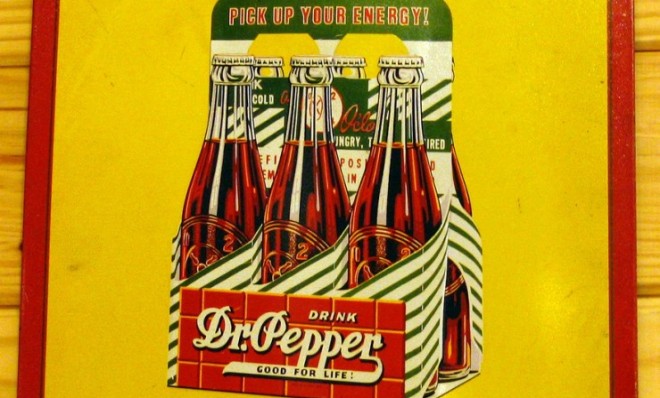10 snack foods originally sold as medicines
There was a time when you could have subsisted on graham crackers, Dr Pepper, and Goo-Goo Clusters and called it a healthy diet

A free daily email with the biggest news stories of the day – and the best features from TheWeek.com
You are now subscribed
Your newsletter sign-up was successful

1. Coca-Cola
It's one of the most famous examples of patent medicine-turned snack food ever. The original intent of Coca-Cola, as you probably know, was a health drink. It was sold for five cents at soda fountains (a dollar or so in today's money) because people thought carbonated beverages would increase their wellness. Pemberton's company also sold Pemberton's Indian Queen Hair Dye and Pemberton's Globe Flower Cough Syrup.
2. Graham Crackers
The Week
Escape your echo chamber. Get the facts behind the news, plus analysis from multiple perspectives.

Sign up for The Week's Free Newsletters
From our morning news briefing to a weekly Good News Newsletter, get the best of The Week delivered directly to your inbox.
From our morning news briefing to a weekly Good News Newsletter, get the best of The Week delivered directly to your inbox.
Graham Crackers were in invented in 1829 by Reverend Sylvester Graham, who felt the bland food was a perfect prescription for those prone to excessive amounts of "self-abuse." Apparently dry crackers would bore the sexual appetite right out of you.
3. Corn Flakes
OK, it might be a stretch to call Corn Flakes a snack food, but I'm sure I'm not alone in downing a bowl of cereal when I want a little something. Will Keith Kellogg was looking for something to improve the diet of hospital patients and decided that corn flakes were a great bread substitute that helped digestion.
4. Goo-Goo Clusters
A free daily email with the biggest news stories of the day – and the best features from TheWeek.com
During the Great Depression, Goo-Goo Clusters were marketed to consumers as a "nourishing lunch for a nickel." Sure, I employ that theory on candy all of the time: Peanuts are protein, chocolate has calcium, marshmallow has... marshmallow.
5. Fig Newtons
Although the Fig Newtons are marketed as "fruit and cake" these days, back in 1892, they were considered digestive aids. A lot of doctors thought that digestion problems were the root of all kinds of other illnesses, so you see a lot of digestive aids from that era. They were originally fig rolls instead of the square pastry we're familiar with now.
6. Moxie
Moxie was one of the first mass-produced soft drinks commercially available, and I now consider myself a pop culture failure because I had never heard of it until now. In fact, it's where we get the word "moxie" from. But back to its "medicinal" roots. It was created sometime around 1876 by a doctor whose friend, Lieutenant Moxie, was using the extract of a South American plant to prevent paralysis, "softening of the brain," nervousness and insomnia. The good doctor took Moxie's plant extract and stuck it in soda water, calling it "Beverage Moxie Nerve Food."
7. Heath Bar
Heath Bar could have just as well been called the Health Bar — the use of the best milk chocolate, almonds, butter, and pure sugar cane was thought to pep a person up. "Heath for better health!" was its motto for many years.
8. 7-Up
This one is probably not a big shocker for you, since many of us still use the miracle tonic to soothe an upset stomach. Originally called "Bib-Label Lithiated Lemon-Lime Soda," it contained lithium citrate, so it really was a mood-stabilizing drink. It was marketed as a hangover cure, which a lot of people probably needed since it was launched just two weeks before the Wall Street Crash of 1929. Never fear (or maybe I should be apologizing) — the lithium was removed from the product in 1950.
9. Dr Pepper
Like Coke and 7-Up, Dr Pepper was sold as a brain tonic and pick-me-up and was available at drugstores to cure what ails ya.
10. McVitie's Digestive Biscuits
The first time I went overseas, I remember being charmed by the fact that some cookies were referred to as "digestives." What a great idea — a guilt-free cookie covered in chocolate! The idea started with McVitie's back in 1892. Because the biscuit contained a high amount of sodium bicarbonate, the inventor theorized that eating the biscuits after a large meal would be beneficial to one's health. They're still called digestives, but McVitie's now prints a disclaimer on them that says "The ingredients in this biscuit do not contain any substances that assist digestion."
More from Mental Floss...
* 25 brand names people incorrectly use as generic terms
-
 Local elections 2026: where are they and who is expected to win?
Local elections 2026: where are they and who is expected to win?The Explainer Labour is braced for heavy losses and U-turn on postponing some council elections hasn’t helped the party’s prospects
-
 6 of the world’s most accessible destinations
6 of the world’s most accessible destinationsThe Week Recommends Experience all of Berlin, Singapore and Sydney
-
 How the FCC’s ‘equal time’ rule works
How the FCC’s ‘equal time’ rule worksIn the Spotlight The law is at the heart of the Colbert-CBS conflict